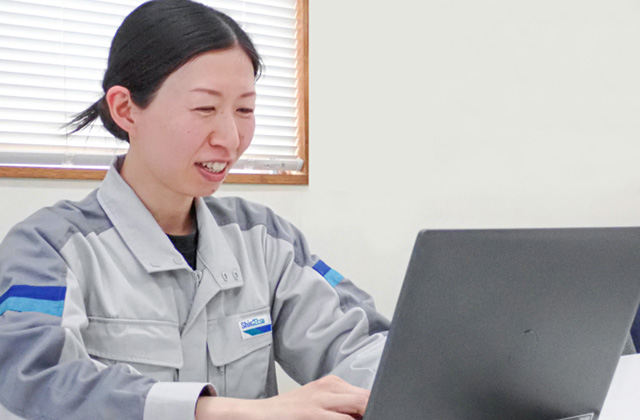Employee Interview: 1

The synthetic pheromones we develop contribute to the sustainability of agriculture and food
E.O.
Specialty Chemicals Research Center, Naoetsu Plant
Joined Shin-Etsu Chemical in 2007.
Joined the Specialty Chemicals Research Center in 2011, and is now in charge of R&D of synthetic pheromones.
Developing synthetic pheromones that contribute to biodiversity conservation
I am in charge of developing synthetic pheromones to control agricultural pests. Pheromones are substances that insects secrete from their bodies to transmit information between individuals of the same species. By artificially synthesizing and using the sex pheromones that female pests use to attract males, we can disrupt their mating process.
Since synthetic pheromones act only on the target pests, they can protect crops without adversely affecting the ecosystem, thereby contributing to the conservation of biodiversity. The use of synthetic pheromones also reduces the frequency of the use of insecticides and other chemical pesticides, helping to conserve water resources and prevent soil contamination. They can also prevent the development of resistance in pests caused by the repeated application of chemical pesticides, and are even effective against pests hiding inside leaves and branches that are difficult to reach with pesticide sprays.
In this way, synthetic pheromones can be said to make a significant contribution to the sustainability of agriculture and food. A particular strength of our products is that they have excellent uniform release performance and consistently demonstrate high pest control efficacy.
Promoting the introduction of formulations based on biodegradable resins
As part of our commitment to responsible production, we manage all processes from the production of pheromone ingredients to the production of formulations, and we are focused on developing and introducing synthetic pheromones based on eco-friendly biodegradable resins. I was involved in introducing these biodegradable resin-based synthetic pheromones into Europe, and that’s when I learned that Shin-Etsu Chemical had first begun considering the use of biodegradable resins more than 30 years ago. The fact that my predecessors had chosen such a future-oriented development topic was extremely inspiring to me. Today, people are demanding products that contribute to sustainability, so I never proceed with R&D without asking how our formulations can contribute to this.
Focusing on expanding the targeted pest species and crop groups
I believe that spreading the use of synthetic pheromones will contribute to sustainability. To this end, the research group considers it particularly important to develop products targeting new pests (synthesizing new pheromone ingredients, formulating them, and studying their effectiveness in controlling pests), and to develop new formulations suitable for crops where they are not yet widely used. The Group is working together as one to promote product development with the aim of further spreading and advancing synthetic pheromones.



